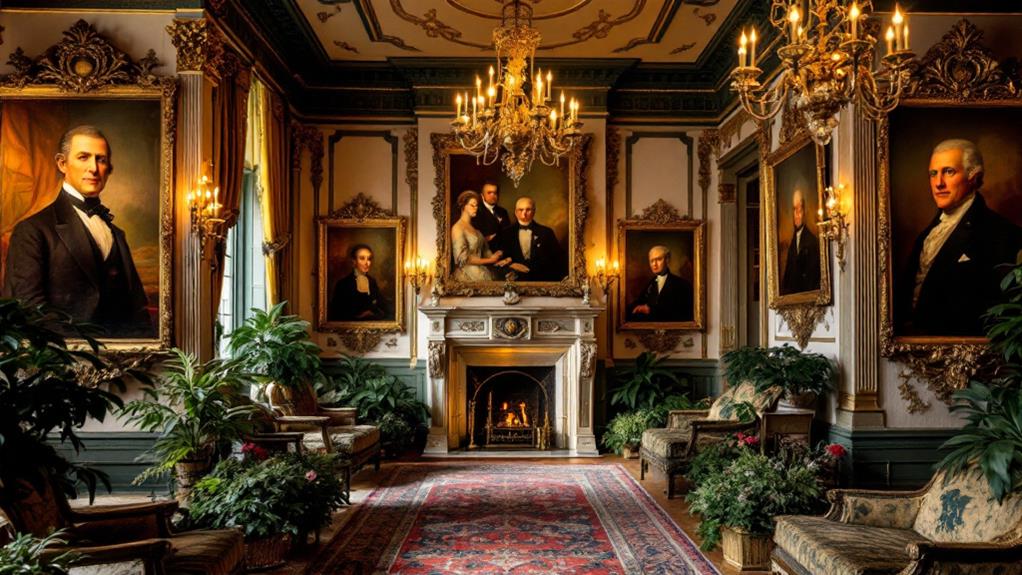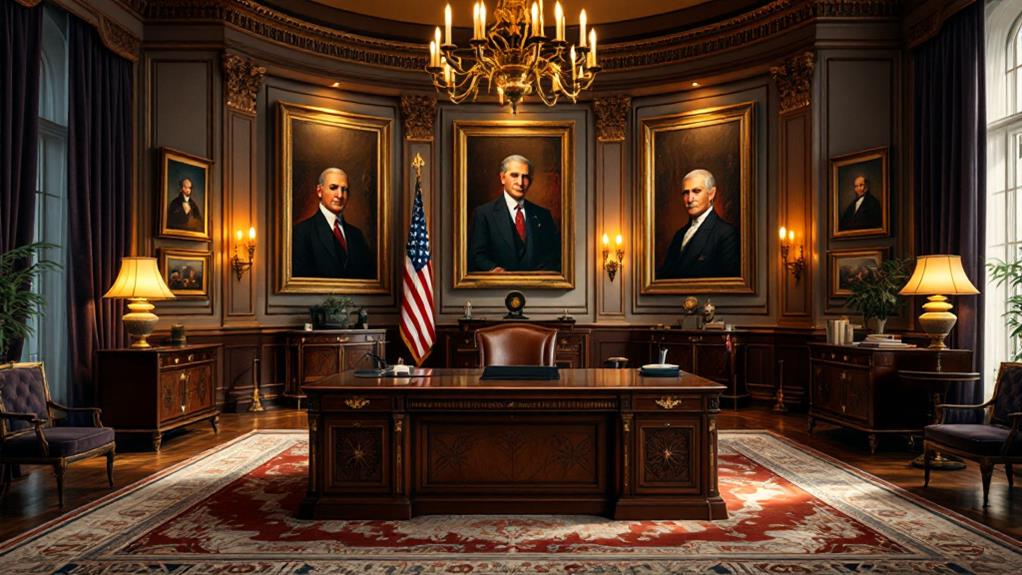Wealthiest U.S. Presidents: From Past to Present

When exploring the wealthiest U.S. presidents, you'll see fortunes shaped by land, real estate, and modern business. George Washington's wealth came from plantations, peaking at $587 million. Andrew Jackson amassed riches through law and land, reaching $133 million. In the modern age, Donald Trump tops the list with a net worth of $3.1 billion from real estate ventures. Other notable wealthy presidents include Theodore Roosevelt and Bill Clinton, who grew wealth through inheritance and post-presidential endeavors like public speaking and book deals. There's much more to uncover about these presidents' financial expeditions and influences.
Early Presidential Fortunes
Many early U.S. presidents were more than just political leaders—they were wealthy landowners who utilized their status to amass considerable fortunes. George Washington, for example, had a peak net worth of about $587 million, largely inherited from his affluent family. His wealth was notably tied to plantation ownership, which was common among early U.S. presidents. Thomas Jefferson also enjoyed a peak net worth of approximately $236 million, though he faced financial difficulties later in life. Like Washington, Jefferson's wealth stemmed from his plantations and inherited resources.
Andrew Jackson stands out as someone who rose from poverty, achieving a peak net worth of around $133 million. He capitalized on opportunities through law, military success, and particularly land speculation, showcasing how early presidents used their positions to strengthen their wealth. Meanwhile, Theodore Roosevelt, who inherited wealth through a substantial trust fund, reached a peak net worth of about $139 million. Despite this, he experienced financial setbacks due to failed investments.
These early leaders often improved their financial standing through land acquisition and agricultural enterprises, reflecting the period's economic practices. Their stories illustrate the complex interplay between political power and personal wealth during their time.
Wealth in the Modern Era
As the landscape of American politics evolved, so did the financial profiles of its leaders. In the contemporary presidency, the trend towards greater wealth is evident, with all U.S. presidents since 1929, except Harry S. Truman, being millionaires. Their net worth often reflects a combination of factors, including inheritance, business ventures, and lucrative post-presidency opportunities.
Donald Trump stands out as the wealthiest U.S. president in history, with his peak net worth hitting $3.1 billion. His financial success largely stems from his real estate empire and substantial inheritance. Bill Clinton, on the other hand, saw his wealth increase markedly post-presidency, reaching a peak net worth of $75.9 million. His financial ascent was fueled by public speaking engagements and book deals, common avenues for ex-presidents seeking financial success.
In the contemporary period, presidents often capitalize on different avenues to enhance their wealth:
- Inheritance: A considerable factor for many presidents.
- Real estate: A profitable investment for some, like Trump.
- Business ventures: Diversifying income sources.
- Public speaking: High fees for speeches post-presidency.
- Book deals: Profitable contracts for memoirs and publications.
The current presidential salary is $400,000 annually, reflecting inflation-adjusted increases over the years.
Notable Presidential Dynasties

Presidential dynasties have left a lasting mark on American history, shaping the nation's political landscape through both wealth and influence. These families have produced multiple U.S. presidents, leveraging their affluent backgrounds and political connections to leave an indelible legacy.
The Adams family set a precedent with John Adams, the 2nd president, and his son John Quincy Adams, the 6th president. Their influence in early American politics showcased the power of familial legacy. Likewise, the Bush family, with George H. W. Bush as the 41st president and George W. Bush as the 43rd, utilized wealth and political networks to impact modern U.S. politics considerably.
The Kennedy family, spearheaded by Joseph P. Kennedy Sr., epitomizes how financial success can translate into political influence. John F. Kennedy, the 35th president, benefited from the family's banking and investment wealth, which bolstered his political endeavors. The Roosevelt family, featuring Theodore, the 26th president, and Franklin, the 32nd, also emerged from affluence, using their resources to navigate political challenges.
Lastly, the Clinton family illustrates how political dynasties can evolve. Bill Clinton's presidency and Hillary Clinton's prominence underscore the blend of wealth and political engagement in sustaining influence. These dynasties highlight the intertwined nature of wealth and political power in shaping U.S. leadership.
Financial Gains Post-Presidency
While holding the nation's highest office doesn't always guarantee immense wealth, leaving the presidency often opens doors to substantial financial opportunities. Post-presidency, many former leaders improve their wealth through various lucrative avenues. Public speaking is a major source of income, with figures like Bill Clinton earning millions from engagements. Autobiographies also serve as substantial financial assets, with George W. Bush and Barack Obama securing considerable royalties from their bestsellers.
Consider these financial gains:
- Lucrative public speaking engagements: Former presidents are in high demand, often commanding hefty fees.
- Successful autobiographies: Books written by presidents frequently climb bestseller lists, adding to their wealth.
- Consulting roles: Providing expertise to corporations can be a major post-presidency financial increase.
- Book deals: Multi-million dollar contracts for writing memoirs are common.
- Corporate sponsorships: Ronald Reagan, for instance, capitalized on such opportunities to secure financial stability.
Harry S. Truman, who faced financial struggles during his presidency, found relief in the presidential pension established in 1958, which provided a safety net for retired presidents. This financial safety net, along with the ability to engage in public speaking and other ventures, guarantees that many former presidents improve their wealth considerably after leaving office.
Economic Impact on Leadership

How does the economic background of a president shape their leadership? It greatly influences leadership styles and political careers. Presidents like George Washington and Thomas Jefferson, who inherited wealth, enjoyed financial security that allowed them to shape national policy without the burden of personal financial constraints. Their considerable fortunes provided the ability to focus on governing rather than economic survival.
In contrast, contemporary leaders such as Donald Trump and John F. Kennedy utilized their economic backgrounds for strong campaign financing and building robust political networks. Their wealth allowed them to maneuver within political circles effectively and influence outcomes. Wealth disparities among presidents also highlight access to education and connections, particularly for those from political dynasties like the Adams and Bush families. These dynasties utilized their resources and status to ascend in politics.
Conversely, presidents who faced economic hardships, like Harry S. Truman, experienced a different economic impact on their leadership. Truman's financial struggles led to the establishment of presidential pensions, reflecting his understanding of financial insecurity. Altogether, the economic backgrounds of presidents not only shaped their individual leadership styles but also mirrored broader societal trends, emphasizing the economic impact on their ability to lead.




